-
Featured Items
-
Featured Resources
 Funding & Grants
Don't miss out on funding opportunities. Stay informed with our up to date online listings and email notifications.
Read More
Funding & Grants
Don't miss out on funding opportunities. Stay informed with our up to date online listings and email notifications.
Read More
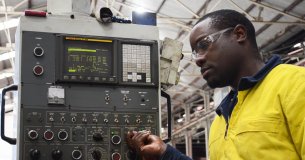 Skilled Migration
Our services help both applicants and employers, to learn more, develop plans, submit applications, and settle in.
Read More
Skilled Migration
Our services help both applicants and employers, to learn more, develop plans, submit applications, and settle in.
Read More
 Research and Analysis
Good research and analysis makes the case. How can our resources and services help your project or application?
Read More
Research and Analysis
Good research and analysis makes the case. How can our resources and services help your project or application?
Read More
 Information & Data Resources
With resources like REMPLAN, Regional Knowledge Base, and decades of data, discover how we can help your project.
Read More
Information & Data Resources
With resources like REMPLAN, Regional Knowledge Base, and decades of data, discover how we can help your project.
Read More
-
Stay InformedSubscribe to one or more of our regular email subscriptions, to be kept up to date on news and funding opportunities for the region
-
-
Our Region
- Our Region
- Regional Plan
- Regional Data
- Current Regional Issues
- Population Migration Analysis for 2016-21
- Job Vacancies Continue at All-Time High
- National Debt - What it Means for Our Economy?
- The True Value of Home Solar
- The Economic Impacts of Local Government Amalgamations
- State of the Regions Report 2014-15
- Antifragility - A different take on regional economic development
- Biohubs - Collaborative Waste Management
- Attracting New Residents
- Socio-Economic Impacts of the Murray Darling Basin Plan
- Murray Darling Basin Water Recovery
- Growing Businesses
- The Northern Inland Economy
- Geographical Overview
- Major Industry Sections
- Our Services
- Grants and Funding
-
Skilled Migration
- Skilled Migration
- Skilled Employer Sponsored Regional Visa
- Skilled Work Regional Visa (subclass 491)
- Temporary Seasonal Workers
- Designated Area Migration Agreement (DAMA)
- Helpful Information for Visa Holders
- Information for Employers
- Case Studies
- Payment Details
- Advice & Further Information
- Contact Details
- News & Events
-
Our Projects
- Our Projects
- Current Projects
- Skilled Migration
- Wool Works - Wool Training Schools
- Metal Works - Welding and Fabrication Schools
- Come On Inland
- Stories of Resilience
- Alt Brothers Beekeeping - Glen Innes
- Carelle's Toy Store - Glen Innes
- Greenhill Orchards - Arding
- Gwydir Meats - Warialda
- Kaputar Motors - Narrabri
- Moonbi General Store - Moonbi
- Sandstock - Tingha
- Sherelle Fashions - Tenterfield
- Sleepy Merino - Inverell
- Tenterfield Chamber of Toursim, Industry and Business - Tenterfeild
- The Welders Dog - Armidale
- Walcha Veterinary Supplies - Walcha
- AGCAP - Agribusiness Careers & Professions
- Northern Inland Regional Investment Profile
- Past Projects
- Digital Economy Strategy
- Business Growth Project
- Go Digital
- How to Start an Online Business
- Create Your Website Using Squarespace
- How to Edit Your Squarespace Site - Part 1
- How to Edit Your Squarespace Site Part 2
- Add a Shop to Your Squarespace Site
- Start a Blog and Find out What Customers are Searching
- 14 Tips For a Better Blog Post
- Which Social Media Platforms are Best for Your Business
- How to Use Facebook Effectively For Your Business – Part 1
- How to Use Facebook Effectively For Your Business – Part 2
- Instagram Tips for Business
- Catching Up, More Instagram & Dealing with Haters
- Getting Started with Twitter for Business
- Social Media Scheduling Tools
- How to Start an Etsy Shop – Part 1 – Research
- How to Start an Etsy Shop – Part 2 – Signup
- Online Security for Your Business
- Product Photography and Website Images: Your Guide
- 5 Tips to Improve your Productivity in your Business
- Best Online Business Resources
- How to Improve Your Communication Skills and Win More Clients
- NBN Coordinator
- Putting Power Back in the Regions
- Road Freight Study
- Town Audit Benchmarks
- Food and Wine
- Youth Survey
- Digital TV Switchover Assistance
- Northern Inland Transport Guide
- Live.Train.Work
- Northern Inland Innovation Awards
- Northern Inland Innovation Awards - 2017
- Northern Inland Innovation Awards - 2016
- Northern Inland Innovation Awards - 2015
- Northern Inland Innovation Awards - 2014
- Northern Inland Innovation Awards - 2013
- Northern Inland Innovation Awards - 2012
- Norther Inland Innovation Awards - 2011
- Prime Super Northern Inland Innovation Awards - 2010
- Prime Super Northern Inland Innovation Awards - 2009
- Northern Inland Innovation Awards - 2007
- Northern Lights Project
- NBN Smart Home
- Murray Darling Basin
- Moree Plains Business Workshops
- Namoi Investment Prospectus
- Industrial Land
- Bioenergy and Local Electricity Retailing
- Northern Inland Business Energy Assessment
- Skills for the Future
- Impacts of COVID-19 on Businesses
- Past Projects of NIRDB
- Aboriginal Employment and Enterprise in the Gunnedah Region
- Art as an Industry
- Aviation Survey
- Farm Forestry - Northern Inland Forestry Investment Group
- New England North West Film Strategy
- Northern Inland Excellence in Business Awards
- Food and Wine 2003 - 2008
- Prime Super Northern Inland Innovation Awards 2009
- Regional Business Networking Program
- Regional Leadership Course 2008
- Viticulture Strategy 2002-2003
- About Us
- Contact Us
- Other Resources
- Privacy and Legal
- Search
Back to Newsletters

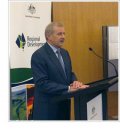
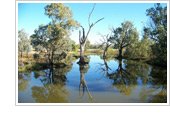
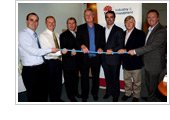
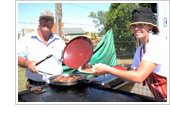
March 2011 Newsletter
Monday 21st of March 2011
In This Issue
- Welcome From The Chair
- The Northern Inland Must Get a Cut of $1.4B Regional Funding
- New Regional Solution to Murray Darling Basin Plan
- Big Interest in NBN Among New England Businesses
- Available Grants & Funding Opportunities
-
Bellissimo! Taste of the Liverpool Plains a Success
Welcome From The Chair

Dear Fellow Northern Inland Residents,
Welcome again to the Regional Development Australia Northern Inland (RDANI) monthly newsletter. Earlier this month I attended the RDA National Forum in Canberra where the RDA Fund was announced for regional Australia. Under the RDAF program, preference will be given to projects that have significant community support and can demonstrate long-term benefits and outcomes for the community. We look forward to seeing innovative proposals from across the region and encourage you to read more about the fund below.
This month we also welcome a new member to the RDANI team. David Thompson has taken on the role of Murray-Darling Basin Project Officer and will be responsible for developing our response to the Murray-Darling Basin issues as well as leading our state and federally funded projects in this area.
David has a background and qualifications in both agriculture and economics, and extensive experience in socio-economic analysis as it relates to irrigated agriculture, climate change and regional development in general. David will be a valuable member of the organisation as we work on this critical regional development issue.
Mal Peters, Chair
The Northern Inland Must Get a Cut of $1.4B Regional Funding

Regional Development Australia Northern Inland (RDANI) will be working hard to make sure the 13 Local Government Areas in our region get a fair share of the Federal Government's $1.4 billion Regional Development Australia Fund announced last week.
RDANI Committee Chairman Mal Peters said the federal fund provided an excellent opportunity to commence regionally significant projects that will build our communities and make them better places to live.
The RDA Fund was announced in Canberra last week by Minister for Regional Australia, Regional Development and Local Government, Simon Crean, to delegates of Australia’s 55 RDA committees attending the 2011 RDA National Regional Development Forum. The Northern Inland area consists of the 13 local Government areas in Northern Inland NSW and is a partnership between Australian, NSW State, and local governments.
Minister Crean said applications would be competitive and merit-based and must have the backing of local Regional Development Australia committees.
"This is an exciting opportunity for the Northern Inland. I am looking forward to working with local councils and regional stakeholders to identify and progress project applications," Mr Peters said.
"The federal fund will provide between $500,000 and $25 million for projects that will boost economic development create local jobs and lift the quality of life in local communities and regions. The announcement demonstrates a great show of faith and trust in local people to shape their own futures." Mr Peters said.
"This is a new way of investing in regional Australia with a focus on local solutions, complete transparency and maximizing long-term economic benefit and potential," Mr Crean said.
The $1.4 billion allocated to the Fund includes $350 million that has been set aside for disaster relief in regional communities.
Applications are now open with the first round of funding allocations to start in July 1. Guidelines are available from www.regional.gov.au/regional/programs/rdaf.aspx.
New Regional Solution to Murray Darling Basin Plan

Regional Development Australia Northern Inland (RDANI) has established a Water Working Group in the Border Rivers–Gwydir Region, to identify local catchment solutions to the Murray Darling Basin Plan (MDBP). This is in response to a request from Minister Simon Crean that RDANI co-ordinate a regional approach.
Chairman of RDANI Mal Peters, said “The Border Rivers–Gwydir Water Working Group (BRGWWG) will complement the Water Working Group already operating in the Namoi region. Together they will provide a forum for comprehensive regional input into water issues for Northern Inland NSW, and a mechanism to leverage from the Federal Government’s $5.8 billion Sustainable Rural Water Use and Infrastructure Program fund and any State Government programs for the benefit of local government areas in the catchments.”
Membership of BRGWWG includes representative from all Local Government bodies in the region, Gwydir Valley Irrigators, Border Rivers Food and Fibre, major industrial water users, the Border Rivers-Gwydir Catchment Management Authority and RDANI.
Mr. Peters said he was confident a robust and acceptable process will develop and RDANI was pleased to announce the appointment of highly regarded David Thompson as the RDANI Murray Darling Basin Project Officer who will be a member of both groups and the coordination point on projects.
The Water Working Groups will provide the local expertise needed to devise suitable projects and give advice on project proposals from other proponents within the region. In addition to the wealth of knowledge about local agricultural and economic issues within the group, a Water Technical Reference Panel will also be established to provide advice on the technical and economic aspects of new initiatives and water reforms.
Mr. Peters said he is acutely aware of the need to obtain a balance between environmental, economic and social objectives within the region. “Their focus will be on opportunities which can meet the environmental objectives of water planning processes, but without compromising the essential economic activities in our regional communities. Socio-economic impacts and utilising local knowledge of the water situation to achieve favourable outcomes are high on the agenda.”
Big Interest in NBN Among New England Businesses

A free information session about the National Broadband Network for small and medium business operators was staged in Armidale recently. Organising began less than three weeks prior to the event and interest was so high that over 60 attendees from as far as Glen Innes were in the audience. The demand for further information sessions is clear, according to Executive Officer of Regional Development Australia Northern Inland (RDANI), Nathan Axelsson. “There are a lot of myths out there in relation to the NBN and what the technology means for local communities and businesses. We will definitely be hosting more NBN information sessions in Northern Inland NSW over coming weeks and months,” Mr Axelsson said.
Representatives from a broad range of small and medium sized New England businesses attended the information session. “They know they stand to benefit from the NBN, particularly with the region having that competitive ‘first-mover’ advantage. This information session opened their eyes to exactly how they might benefit,” Mr Axelsson said.
Collaborative partners behind the information session were: Industry & Investment NSW, RDANI, the Industry Capability Network (ICN), Armidale BEC, and the Armidale & District Chamber of Commerce.
Former UNE Physics senior technical officer, Graham Hyde began with a concise explanation of how optic fibre works and how it supersedes copper wires. Principal presenter, Alun Davies followed on from that thread. As the Head of the NBN Work Group New England and a regional communications advocate, he passionately conveyed the potential of NBN for residences and businesses in the area. Mr Davies went from explaining cloud computing to smart houses, which would foster such outcomes as sustainability and security measures and high definition video conferencing, which would boost social inclusion through greater connectedness.
NBN Co Community Relations Adviser Darren Rudd addressed the business-minded audience, updating on the rollout and explaining its delays. “It was great to get members of the local business community together. It was good for them to learn what is going on with NBN technology elsewhere in the world and why it’s commercially important that we do it right, here in Armidale,” he said.
As to when those in the first release trial zone in Armidale will be ‘switched on’…“We’re starting pre-commission trials in the next several months. We plan to have full network ready services online early next year in the first release trial zone. People there can expect to be approached by internet service providers in coming months. Naturally, consumers can start shopping around with internet retailers who have signed up with NBN Co,” Mr Rudd said.
Northern Inland NSW will benefit from Armidale’s selection as one of the first trial sites in Australia. “When we come to a location, we keep building out because we’ve become familiar with the area, the stakeholders, the available labour and contractors – it’s the efficient way to go. An announcement will be made in the next couple of months regarding the second release site, being the rest of Armidale.”
Available Grants & Funding Opportunities
RDANI holds information on many grants available to community groups. The following are just a few current grants and funding opportunities available. Please use the links for more information and relevant grant guidelines and applications. Further information on community grants can be found at www.grantslink.gov.au.
Information on how to write funding applications as well as how to run your project, can be found at www.communitybuilders.nsw.gov.au.
Regional Development Australia Fund
The Australian Government’s new Regional Development Australia Fund (RDAF) is a national program to support Australia’s regions and enhance the economic development and liveability of their communities. The program is administered by the Department of Regional Australia, Regional Development and Local Government. RDAF will inject close to $1 billion in funds into local projects (with some of the funds subject to the passage of the Minerals Resource Rent Tax).
The program aims to support localism, and to leverage and better coordinate state, Commonwealth, local government and private (including not-for-profit) investments for the long term benefits of communities. It is based on the principle that regions and their communities are best placed to identify the key development opportunities that will support sustainable economic and community growth and to ensure that investments are targeted at projects of lasting benefit. The first funding round is now open for applications. The first round will look to contribute up to $100 million of Commonwealth funding to approved projects. Applications will be received up to COB on Friday 13 May 2011. For further information and a copy of the guidelines, visit www.regional.gov.au/regional/programs/rdaf.aspx.
Next Gen Farmers
The next round of Next Gen Farmers (NFG) grants offers support for activities that will build the leadership and representative capacity of young people entering or involved in primary industries, particularly in the context of the challenges and opportunities facing these industries as a result of a changing climate.
Under the The Next Gen Farmers grants round, the Australian Government will provide funding of up to a maximum of $50,000 (GST exclusive) for eligible activities. For example, previous NGF grants have been approved between $4,273 and $50,000.
Applicants should consider the types of project activities that will achieve the best results for young people entering or involved in primary industries and living and working in rural, regional and remote Australia.
Activities may include programs conducted via workshops, seminars, conferences or industry events or other innovative mechanisms to improve networking, management, leadership and/or the representative capability of young people. For further information, visit www.daff.gov.au/climatechange/australias-farming-future/community_networks_and_capacity_building/next-gen-farmers.
TQUAL Grants
A new round of TQUAL Grants – Tourism Quality Projects is now open.
TQUAL Grants aim to generate growth in the Australian tourism industry by encouraging businesses to create quality tourism products and experiences.
Depending on the size of your project, you may receive up to $1 million in funding. To be eligible, your project should be one of the following:
- an implementation project, such as an innovative tourism product, service or experience refreshment or upgrade.
- an initiation project, such as a feasibility study.
- a project that supports the tourism industry’s capacity to be innovative and productive.
For more information or to apply for a TQUAL Grant, visit the Department of Resources, Energy & Tourism website: www.ret.gov.au/Department/archive/tqual/tgrants/Pages/default.aspx.
AusIndustry Grants and Funding Programs
The AusIndustry website provides an overview of all the business assistance programs AusIndustry delivers. Visit: www.ausindustry.gov.au/Pages/AusIndustry.aspx.
Bellissimo! Taste of the Liverpool Plains a Success

The second biennial “Taste of the Liverpool Plains” event at the Caroona Hall on Sunday was a resounding success. The community driven event showcased local produce, food, wine and fashion, with a focus on sustainability.
Up to 3,000 attendees converged on the Liverpool Plains for the regionally significant ‘foodie’ event. They came from throughout Northern Inland NSW and beyond. There was a plethora of passionate producers, proudly offering test-tastes, with an abundance of locals and visitors hungry to savour the flavours of the Liverpool Plains. There were grains, gourmet meats, through to olives, garlic, condiments from relish to hommus, jams, wine, lavender, cheese, pasta, berries, cotton products, honey, plants, cakes and more.
The Caroona Hall was packed for the sustainability presentations, as the primary producers heard how their renewable industries could be even greener.
President of the organising committee, Carol Mackerras said that the success of the “Taste of the Liverpool Plains” was due to the support from the local community. “We highlighted the range and quality of the produce of the local area and how the agricultural (food) production in the area constitutes an important and renewable industry. Our farmers are sustainable but they are also innovative and proactively looking to improve environmental and financial outcomes. So there was strong interest in the sustainability product displays and guest speakers,” she said.
There was political support for the event. “This is an incredibly productive agricultural area. I wasn’t surprised by the huge turn-up. The people here are passionate about what their district is producing and the potential impact of coal-seam gas and mining on the sustainability and productivity of the Liverpool Plains. They are keen to understand the science involved,” Member for New England, Tony Windsor said.
Regional Development Australia Northern Inland Food and Wine Project Officer, Kim-Trieste Hastings said that there are many economic and social benefits when food and wine producers come together on a regional level, promoting their produce and the district in general. “With support from Industry and Investment NSW, RDANI has worked to encourage such regional approaches,” she said.
Related Pages







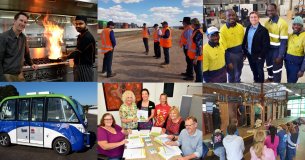 Latest News
Latest News
